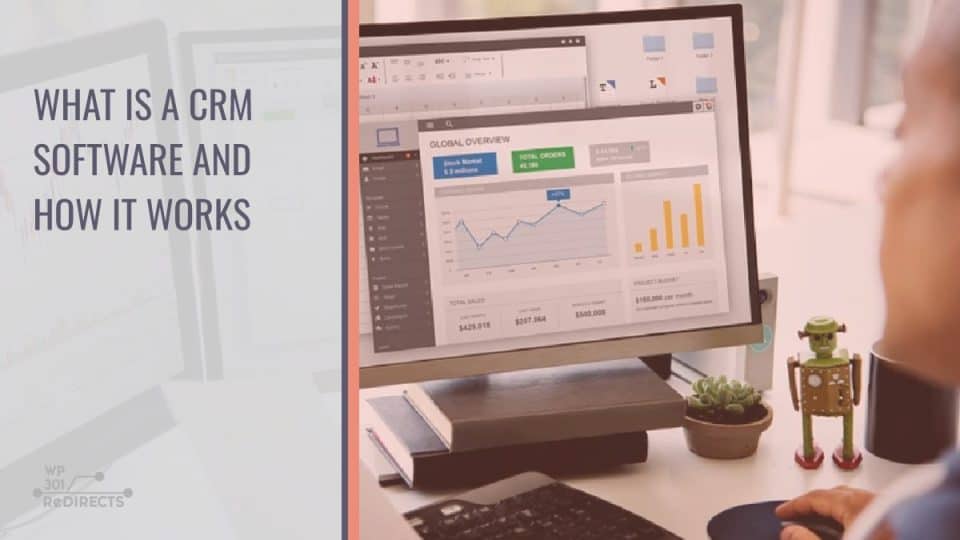Customer relationship management (CRM) is the combination of strategies, practices, and technologies that are used by companies to manage and analyze customer data and interactions throughout the lifecycle of the customer. The goal of a CRM software is to assist in customer retention, drive sales growth, and improve customer service relationships.
CRM software allows marketers to analyze and manage relationships with current and potential customers; it collects information about the customers and enables tracking of every interaction with the company. That allows marketers to know exactly who the person they’re talking to is and their history with the company, which makes the interaction more personalized, and encourages customer trust and loyalty.
This software includes functionalities that make it easier to track customer/company interactions through several available touchpoints like contact forms, e-mails, phone calls, search engines, social media, and so on. This type of software is the best when it comes to automation of marketer’s repetitive tasks, setting reminders for important events, and displaying alerts if something needs attention.
How does a CRM work?
CRM platforms offer marketers a lot of different functionalities which are useful for the optimization of their business.
Some of them are:
- Marketing automation – Some CRMs offer marketing-automation functionalities in order to automate certain tasks. The system can automatically send customers e-mails or publish social media posts according to the set schedule.
- Workflow automation – CRM platforms help businesses optimize processes by doing mundane automated work, enabling employees to focus on more creative tasks.
- Sales automation – CRMs will track customer interactions and automate selected business functions that are necessary to follow leads and attract new customers.
- Lead management – CRM tracks important leads for the company, which allows marketing teams to enter new leads in the system and later analyze data about them.
- Individualized customer experience – CRM can create personalized and consistent experiences for existing and potential customers through various marketing channels, which help to increase conversations and boosts brand awareness.
- Analytics – CRM solutions offer built-in analytics tools that provide insights into the quality of the customer experience.
- Artificial intelligence – a lot of CRM solutions have AI capabilities built into their system in order to automatically recognize patterns that lead to successful sales.
What are the advantages of using CRM?
Increased Sales
Sales increase when customers keep coming back, which is what CRMs help with the most. This type of software helps with building up the sales pipeline and automating the main tasks, which usually takes up a lot of time.
Higher Productivity
While using a CRM software, employees can focus more on human-centered work and building customer relationships, which increases their productivity and creativity. That is possible because of CRM marketing automation tools which free up employees and give them more time to work on other, more important things. Those tools also make sure that all of the tasks are completed, and none fall through the cracks.
Better Marketing
CRM software allows marketers to create more targeted marketing campaigns aimed at customers’ specific needs. That means that business owners will have better information about what their customers actually want to buy, which again improves customer relationships and increases sales.
Increased Profitability
Using a CRM software is great for identifying which customers are profitable and which aren’t, and that knowledge helps with dealing with each segment in the most cost-effective way. Once marketers know which customers are profitable, they can focus their attention on them and increase profitability. They can also optimize costs by doing that.
Improved Relationship with Customers
One of CRM’s main benefits is improved relationships with customers. A CRM system manages all business contacts and stores important information about them, including demographics, purchase history, and previous communications. All that information is easily accessible to anyone in the company, which makes employees’ jobs much easier.
Good customer service builds customer loyalty. CRM software can improve customer service, thereby building customer loyalty. High customer turnover is not a good look for the company and can have a negative impact on sales and brand reputation. However, with CRM, the customer service will improve, and the customers will keep coming back.
In Conclusion
A customer is a lot more than just a sales opportunity. If you don’t treat your customers right, you won’t sell anything, even though you might have the best product to offer. That’s why building a good relationship with customers is crucial in any business.
That’s exactly what CRM does. It helps you maintain a good relationship with customers by treating each one individually and never forgetting anything about them. If you’re having trouble with customer relationships, CRM is the best way to go.
